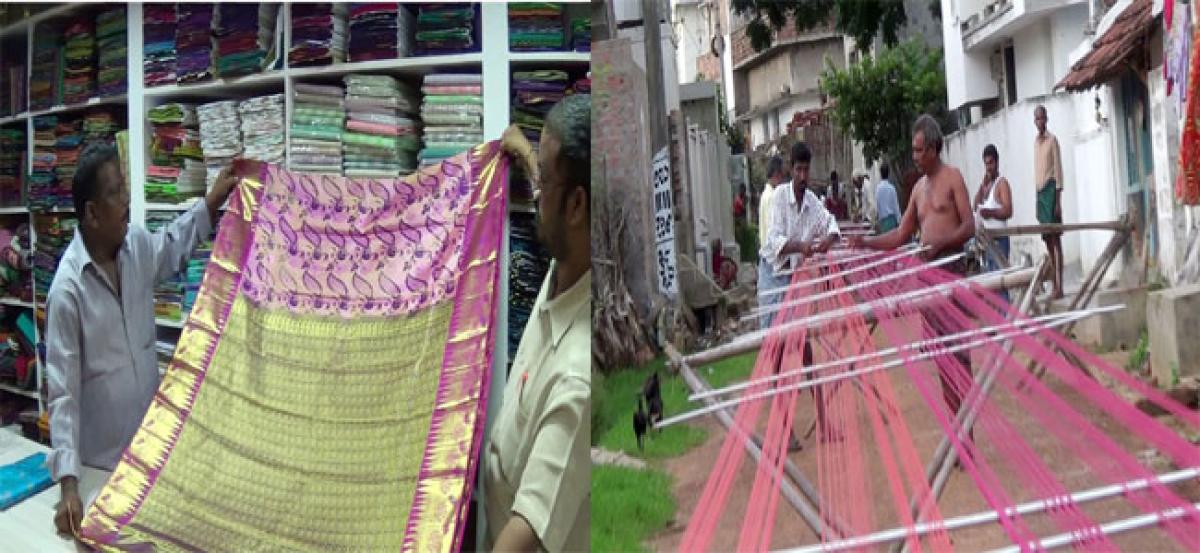Live
- Nitish reaffirms his commitment to NDA, reiterates joining Mahagathbandhan was a mistake
- PKL Season 11: U Mumbai meet UP Yoddhas in opening clash of exciting second leg in Noida
- Cong divides people on caste & religion lines for political gains: Shahnawaz Hussain
- Pushpa-2: The Rule to Launch Grand Promotional Tour Across Seven Indian Cities
- Maha polls: Congress accuses BJP of pursuing ‘divide and cut’ policy to divert attention
- His currency supply has ended: Ashwini Choubey's jibe at Tejashwi
- Rahul Gandhi should feel ashamed, his ancestors did nothing for tribals: Babulal Marandi
- Avoid challenging constitutional institutions: VP Dhankhar
- Maha polls: BJP hurls questions at INDIA bloc amid Ulema Board's conditional support to MVA
- Regional rural banks must empower MSMEs via flagship govt schemes: FM Sitharaman
Just In

The handloom weaver in East Godavari district is facing a tough time with elusive government assistance, lack of quality training to upgrade his skill and non-receipt of subsidy. Added to his woes, the cooperative societies are weak. This is the sad state of the handloom sector in the district which has more handloom weavers than elsewhere in the state. Oddly, this sector is the second most impor
Pithapuram: The handloom weaver in East Godavari district is facing a tough time with elusive government assistance, lack of quality training to upgrade his skill and non-receipt of subsidy. Added to his woes, the cooperative societies are weak. This is the sad state of the handloom sector in the district which has more handloom weavers than elsewhere in the state. Oddly, this sector is the second most important profession after agriculture here.
Of the total population of 51 lakhs, weavers’ families number 5.8 lakh. About 75 per cent of them depend directly on the handloom sector. The district holds the patent for production of world famous Jhandhani saris. Uppada and Dharmavaram saris are also produced in the district. Although the weavers are meeting the sari needs across the country, their lives are full of miseries.
In these days of power looms, there is no encouragement for skilled weavers. They lack adequate wages for decades. Speaking to The Hans India, some weavers expressed distress that even a MGNREGS worker earns more money compared to them.
Even today, saris are woven on traditional looms in villages like Uppada, Tatipatri, Gollaprolu, Peddapuram, Angara, Ambajipeta and Dharmavaram. This work needs skill, besides toil based on strength. 80 per cent of over 50 weavers’ societies in the district are facing losses.
Many of these societies are in doldrums, as many weavers are not joining as members. Of the total 75,000 weavers, only 40,000 are members of these societies. About 20,000 of the non-members are working with master-weavers. Thus, they get no assistance from either the state government or the societies.
The government provides no special training for weavers. They only retain the tricks of the trade from their fathers and grandfathers. Due to lack of proper training, many youngsters are switching to other means of livelihood, neglecting traditional weaving.
Handloom weavers in the district still depend on traditional looms. Some of the weavers told THI that they need new looms, spare parts, implements, charkas, along with colouring and processing units. Gangadhar, a leader of handloom weavers’ society in Tatipatri, has launched an agitation to press the demands of the weavers.
With no marketing facility available, it is only in Uppada and Dharmavaram that handloom saris are being sold. During the regime of the late N T Rama Rao, handloom cloth was available in FP shops and the same fabric was encouraged as uniform in some government departments. No such schemes are available now. Thus, the weavers think of organising exhibitions by setting up rural business centres.
The recently introduced GST is proving to be a curse for weavers since the five per cent additional tax is also collected from them only. The master-weaver deducts the tax amount from the salaries of weavers and weavers are the ones to suffer when there is a fall in the sales due to less production.
Weavers’ United Front State convener Thuthica Srinivas demands setting up of handloom navaratnas if the government is serious about coming to the rescue of the handloom sector and implementation of a comprehensive national policy. Srinivas demands a handloom corporation with Rs.2,000 crore capital and cooperation offered to APCO and weavers societies to increase the production. He demands implementation of the ‘Pithapuram declaration’.
By Saride Nageswara Rao

© 2024 Hyderabad Media House Limited/The Hans India. All rights reserved. Powered by hocalwire.com







